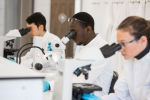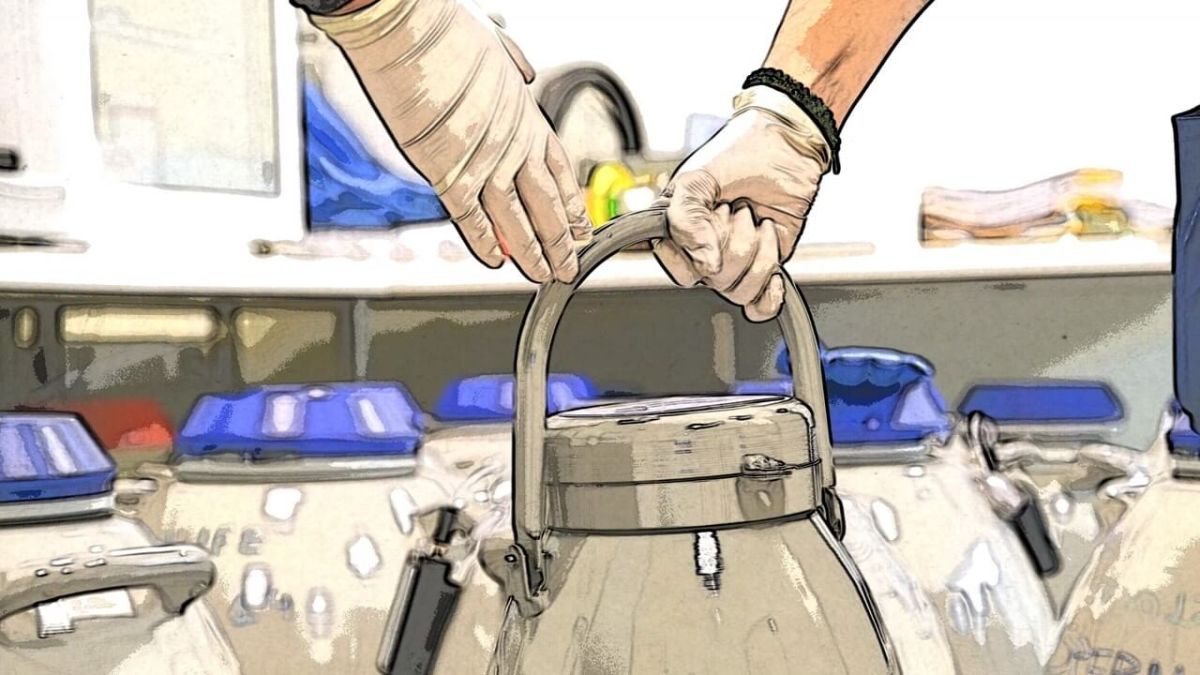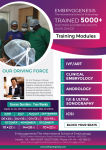
IVF NewsCourse: MSc in Clinical Embryology: Applications for entry in October 2023
Laura Rose 09 October 2022

We no longer accepting applications for applications for the MSc in Clinical Embryology course starting in October 2023. This one year, residential, taught MSc provides graduate students, scientists and clinicians with highly advanced theoretical and practical understanding of human reproductive biology, embryology, infertility and assisted reproductive technology (ART) along with intensive ‘hands-on’ practical training in essential laboratory skills and the sophisticated gamete micromanipulation techniques associated with ART. The department's aim is to inspire, motivate and train a network of future leaders in clinical embryology throughout the world. For details of how apply including the admissions criteria please see our admissions page: http://www.ox.ac.uk/admissions/graduate/courses/msc-clinical-embryology For further information please contact the Course Coordinator: [email protected] Follow us on Twitter: @Ox_MSc_ClinEmb Photographs: © Medical Sciences Division and John Cairns [ Full Article ] Announcement: Hands on Training 2022
Dr. Sarabpreet Singh 03 October 2022
 The Fertilis Academy in association with Artemis Hospitals is organizing a Hands-on training on 'Gamete Handling/IVF/ICSI' and 'Vitrification of Embryos' from 4th to 13th November, 2022.
The venue for the training will be Artemis Hospital, Sector 52, Gurugram.
Interested candidates can visit the link https://www.thefertilisacademy.com/hands-on-training/ for details.
📍For any queries,
Call us: +91-9899009497
Whatsapp us - https://wa.link/facvm6
Explore more about us at www.thefertilisacademy.com
(Find the link in bio.)
**Certificate will be awarded at the end of the course.
The Fertilis Academy in association with Artemis Hospitals is organizing a Hands-on training on 'Gamete Handling/IVF/ICSI' and 'Vitrification of Embryos' from 4th to 13th November, 2022.
The venue for the training will be Artemis Hospital, Sector 52, Gurugram.
Interested candidates can visit the link https://www.thefertilisacademy.com/hands-on-training/ for details.
📍For any queries,
Call us: +91-9899009497
Whatsapp us - https://wa.link/facvm6
Explore more about us at www.thefertilisacademy.com
(Find the link in bio.)
**Certificate will be awarded at the end of the course.
[ Full Article ] Webinar: CRYOGOVERNANCE V - BEST PRACTICES IN CRYOTRANSPORTATION
International IVF Initiative 26 September 2022

11th Oct 2022, 3pm EST LIVE, 8pm UK, 9pm CET [ Full Article ] News: Protein that helps sperm fuse with egg identified
Dr George Janes 26 September 2022
A newly discovered protein which facilitates egg and sperm fusion provides new insights into human fertilisation. Over half of infertility cases cannot be explained, meaning that treatments based on current understanding may not be effective for every patient. Using an artificial fertilisation technique, researchers have revealed a novel protein controlling the attachment of sperm to eggs, shedding new light on the mechanisms of conception. Professor Harry Moore of the University of Sheffield and lead author of the study said: 'Infertility is unexplained in more than half of those who struggle to conceive naturally. What we know about fertility in humans has been severely limited by ethical concerns and the lack of eggs for research.' The study, published in Science Advances, describes how the team used microscopic beads, each coated with a specific protein fragment, to screen the role of many proteins in sperm-to-egg attachment. Using this method, they discovered that beads coated with a section of one protein, MAIA, named after the Greek goddess of motherhood, bound a high number of sperm. The scientists showed that MAIA acts together with a previously identified sperm-binding protein called JUNO to anchor sperm to the egg's surface. They introduced the genes for MAIA and JUNO into hamster egg cells and found that this enabled them to bind human sperm, something they ordinarily would not be able to do. PET trustee, Professor Allan Pacey of the University of Sheffield and co-author of the study said: 'This discovery of the MAIA protein is a major step forward in how we understand the process of human fertilisation. It would have been almost impossible to discover without the use of the artificial beads to replicate the surface of human eggs as we simply wouldn't have been able to get enough eggs to do the experiment. A classic case of thinking out of the box.' These findings elucidate how gamete fusion occurs and could explain the idea that, between humans, some people's sperm may not be compatible with others' eggs. The discovery of this mechanism and future work could help explain why some patients cannot easily conceive. Professor Moore commented: 'The ingenious artificial fertilisation technique which enabled us to identify the MAIA protein will not only allow scientists to better understand the mechanisms of human fertility but will pave the way for novel ways to treat infertility and revolutionise the design of future contraceptives.' Sources and References
[ Full Article ] News: Human cells mimicking early embryogenesis generated
Dr Emma Green 26 September 2022
A type of embryonic cell has been generated from human stem cells for the first time, providing a method to study post-implantation development. Published in Cell Stem Cell, researchers at KU Leuven, Belgium, have created extraembryonic mesoderm cells (EXMCs) from human induced pluripotent stem cells (iPSCs). The cells closely resemble those naturally formed in human embryos, providing a good model to study early development in vitro. 'We are very excited because now we can study processes that normally remain inaccessible during development,' said lead author Professor Vincent Pasque. 'The model has already enabled us to find out where extraembryonic mesoderm cells come from. In the longer term, our model will hopefully also shed more light on medical challenges such as fertility problems, miscarriages, and developmental disorders.' Ethical and technical limitations mean that early human embryo development is difficult to study. Human stem cell models provide an accessible way to study specific cells and their processes. Human iPSCs have the capacity to generate all cell types in the body. The extraembryonic mesoderm forms early in embryonic development just after implantation. EXMCs generate the first blood in the embryo, aid in attaching the embryo to the future placenta, and are involved in forming the primitive umbilical cord. 'In humans, this type of cell appears at an earlier developmental stage than in mouse embryos, and there might be other important differences between species. That makes our model especially important: research in mice may not give us answers that also apply to humans' said Professor Pasque. This new cell model is a step forward in understanding human cell development and may provide a way to study a variety of developmental disorders. Sources and References
[ Full Article ] News: Hyaluronic acid may boost chance of live birth
Melinda Van Kerckvoorde 26 September 2022
A large data analysis study has found that embryo exposure to hyaluronic acid prior to transfer could improve IVF success rates for patients using their own eggs. Hyaluronic acid is an adhesive compound that is secreted by the cells surrounding the egg and is naturally present in the female reproductive tract. Following in-vitro fertilisation, embryos are kept in a liquid medium before being transferred back to the womb. Many studies have investigated whether adding hyaluronic acid to the culture medium could be a simple and cheap way to improve IVF success. A data analysis published in Human Reproduction suggests that it may increase live birth rates for some patients. 'We found that when women use their own eggs, exposing to hyaluronic acid for ten minutes before placing it in the uterus increased the likelihood of a cycle resulting in a birth by 32 percent to 39 percent,' said Dr Devorah Heymann from Kaplan Hospital in Rehovot, Israel who led the study in partnership with Hebrew University, Jerusalem, Israel. The research team analysed data from 15 clinical trials to compare the effect of hyaluronic acid on pregnancy outcomes between patients who used their own eggs or donor eggs for IVF. A total of 4686 IVF patients were included in the study whose embryo culture medium contained high or low concentrations or no hyaluronic acid. Following statistical analysis, the researchers claim that culture media containing high concentrations of hyaluronic acid increase the number of live births and clinical pregnancies from 36 percent to 43 percent and 42 to 47 percent, respectively, when using the patient's own eggs. No beneficial effect on pregnancy outcomes was observed when using donor eggs. The team had previously carried out a Cochrane Review in 2020 which had also shown that hyaluronic acid treatment could help people who use their own eggs for IVF. Given the increased demand for donor eggs, hyaluronic acid treatment thus could help patients to conceive even when their own eggs are of poorer quality. Furthermore, this study could provide more evidence for the Human Fertilisation and Embryology Authority which currently lists hyaluronic acid addition during IVF as a treatment add-on with conflicting results. The researchers highlight that more data is needed to reveal the true effect of hyaluronic acid when using donated eggs and that further research is required to understand the underlying mechanism of hyaluronic acid. Sources and References
[ Full Article ] Announcement: IMT Matcher - IVF Witnessing System
EART 14 September 2022

𝗦𝗵𝗶𝘃𝗮𝗻𝗶 𝗦𝗰𝗶𝗲𝗻𝘁𝗶𝗳𝗶𝗰 𝗶𝗻𝘃𝗶𝘁𝗲𝘀 𝗬𝗢𝗨 𝘁𝗼 𝗷𝗼𝗶𝗻 𝘂𝘀 𝗟𝗜𝗩𝗘 𝗼𝗻 𝟭𝟴𝘁𝗵 𝗦𝗲𝗽𝘁𝗲𝗺𝗯𝗲𝗿 𝟮𝟬𝟮𝟮, 𝗦𝗨𝗡𝗗𝗔𝗬 𝗮𝘁 𝟭𝟭:𝟬𝟬𝗮𝗺 [ Full Article ] News: Further stages of development observed in mouse embryo models
Dr Rachel Montgomery 05 September 2022
'Synthetic' model embryos made using mouse stem cells and an artificial incubator are the closest a stem-cell-derived embryo model has ever come to resembling a naturally developing embryo in the uterus. Researchers from the University of Cambridge and the California Institute of Technology grew the so-called 'integrated stem cell-based embryo models' for 8.5 days (complete mouse gestation is 18-21 days) – long enough to develop a beating heart and the foundations of all other organs. 'The stem cell embryo model is important because it gives us accessibility to the developing structure at a stage that is normally hidden from us due to the implantation of the tiny embryo into the mother's womb' said lead researcher Professor Magdalena Zernicka-Goetz from the University of Cambridge. As reported in Nature, the models were developed by combining three different and specific types of stem cells: one that will develop into the embryo, with the other two developing into extraembryonic structures including the placenta and yolk sac which provides the early embryo with nutrients. When combined in an artificial incubator, the stem cells were found to signal to each other via touch and chemical messengers, allowing them to spontaneously self-organise into embryos. These synthetic models also reached the point where the entire brain, including the anterior forebrain, began to develop. 'The embryos struggle to grow beyond that point because they require a placenta which we cannot reproduce in vitro', first author Dr Gianluca Amadei from the University of Cambridge told the Financial Times. The recent work builds on very similar work published earlier this month by Professor Jacob Hanna at the Weizmann Institute of Science in Israel, who genetically altered stem cells to create mouse embryo models and also allowed them to develop for 8.5 days. Both studies found the process highly error-prone, with only one in 100 attempts being successful. Nonetheless, the team hope that their findings could have a number of implications, from improving the understanding of normal development and helping to better understand why some embryos go on to develop into a healthy pregnancy, while many others fail. The team are also working on developing human embryo models, but stress that these efforts are considerably further behind given the differences in understanding between early human and mouse development. Having a lab-grown human embryo model available for research could be a major advance for the study of fertility and common developmental disorders, but also highlight the importance of ongoing ethical and legal conversations about the status and use of model embryos and natural human embryos in research. Sarah Norcross, director of PET, said: 'Unlike actual human embryos, stem-cell-based embryo models in humans and other organisms are not restricted by a 14-day rule…These models are extremely helpful for research, but there still remains a case for changing the law to extend the 14-day rule, so that we can continue to learn from the precious embryos that have been kindly donated by fertility patients following their treatment.' Sources and References
[ Full Article ] News: Frozen embryo IVF may increase childhood cancer risk
Michael Limmena 05 September 2022
Children born from IVF using frozen embryos may have a higher risk of developing childhood cancer according to a new study; however, the overall risk remains low. Frozen embryo transfer, sometimes called frozen-thawed embryo transfer, is a process in which embryos are frozen before being thawed and implanted for pregnancy. Worldwide, this type of fertility treatment is becoming increasingly more common; and children born from IVF using frozen embryos now exceeds those born using fresh embryos in many countries. 'A higher risk of cancer in children born after frozen-thawed embryo transfer in assisted reproduction, a large study from the Nordic countries found,' said co-author Professor Ulla-Britt Wennerholm from the University of Gothenburg, Sweden. [However] no increase in cancer was found among children born after assisted reproduction techniques overall,' she added. While elective freeze-all embryo cycles are becoming more common, the long-term medical risks of children being born from frozen embryos remain not well understood. In particular, there are many conflicting studies on the link between children being born using frozen embryos and a higher risk of developing childhood cancer. Scientists from the University of Gothenburg performed a cohort study using data from almost eight million Scandinavian children, publishing their findings in PLOS Medicine. The research team analysed the medical records from 7,944,248 million children born in Denmark, Norway, Sweden, and Finland between 1984 and 2015. Of these, 171,744 were born after IVF while the remaining 7,772,474 were not. Among those born after IVF, 22,630 were born using frozen-thawed embryos. The researchers found that these children were almost two times more likely to develop childhood leukaemia than those born using fresh embryos or natural conception. However, when frozen and fresh embryos were analysed as a single group, children born after IVF did not lead to a higher risk of childhood cancer. 'The large investigation of almost eight million Nordic children is highly impressive.' said CARE Fertility Group's chief scientific officer Dr Alison Campbell, who was not involved in the study. Despite the study's findings, the researchers emphasised that the results should be interpreted cautiously. Although the study is very large, it is important to note that out of the 22,630 children born after frozen-embryo transfer, only 48 of them later developed cancer. This limits the statistical strength of the study. Moreover, this study cannot determine causation and that the slightly elevated risk, according to the research team, may be due to many different factors wholly unrelated to frozen embryos. 'People who have children born following frozen embryo transfer should not be unduly concerned by the findings because the actual number of children affected by cancer, following frozen embryo transfer, is too small to draw firm conclusions,' noted Dr Campbell. Sources and References
[ Full Article ] News: ART & Embryology training program
Chennai Fertility Center and Research Institute 03 September 2022

October 2022 Training Batch Schedule - 10th Oct - 22nd Oct 2022 The International School of Embryology was established to offer training for Clinicians in advanced Reproductive Technologies. Our skill and precision to all aspirants help them to know in-depth knowledge and experience. The members of our teaching faculty aim to bring doctors and embryologists to the highest level of knowledge about reproductive techniques and practical capability in the field. Our courses cover basics in Andrology, embryology, ICSI, and cryosciences (Hands-on). Limited Seats. For admission Contact 9003111598 / 8428278218 [ Full Article ] |